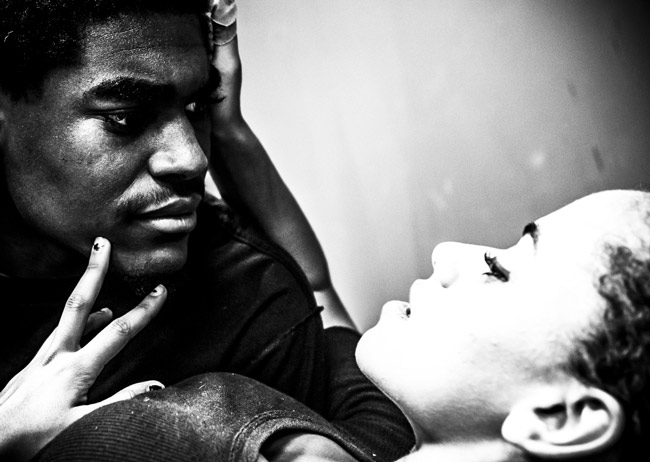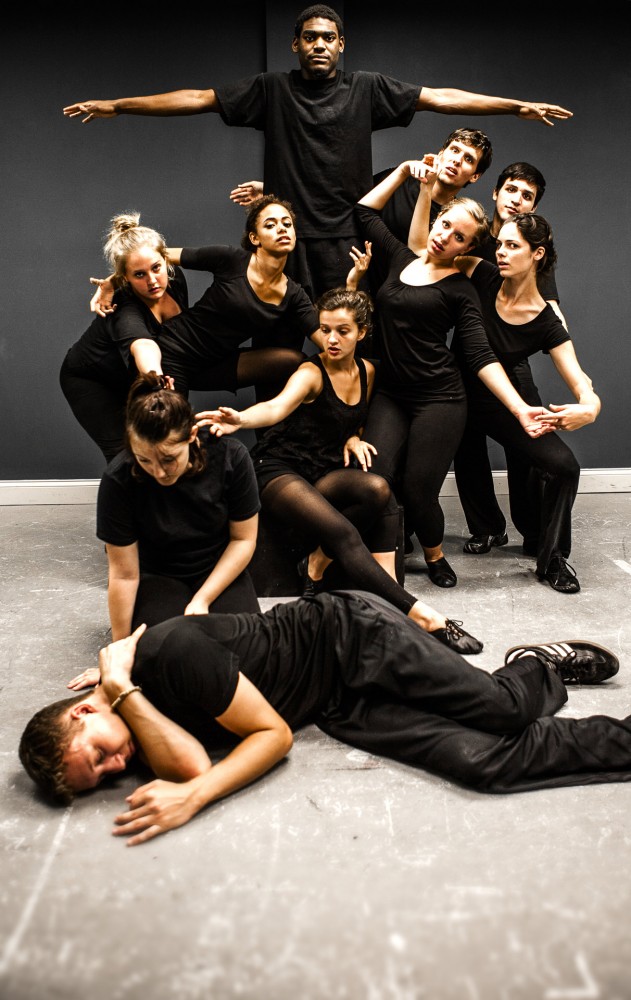
“The Serpent: A Ceremony” will be staged Friday and Saturday, July 19 and 20, at 7:30 p.m. and Sunday, July 21, at 2 p.m. Tickets are $15 for adults, $10 for students. Friday’s performance is sold out. But tickers easily online here.
The first word in “The Serpent,” the play that opens tonight at Palm Coast’s City Repertory Theatre and runs through the weekend (tonight’s performance is sold out), is “Autopsy.” The word hangs over the play like a dedication, because if there is any plot at all in “The Serpent”—one of the most original and most unusual works you’ll see staged—it’s that line between life and death, its thinness and its implications from Abe’s murder of his brother Cain to the assassination of John Kennedy to Adam’s fateful bite at the apple in the Garden of Eden, home of the play’s namesake.
Along the way, the 10 young actors, all of them between 15 and 23, will recreate moments from the Book of Genesis just as they’ll be recreating themselves in all sorts of ways (and recreating the notion of what theater is), making you doubt what you see and hear at every turn and making you wonder, as the characters themselves do, what may be next, and what it may mean. “The Serpent” never tells. It’s one of the strengths of the play: there’s no preaching. There’s a lot of showing, despite a bare stage where actors are characters, props, ideas, soundtracks and illusions all in one.
For a play like that to be staged in Palm Coast, it can only have one signature: that of John Sbordone, the founder of the Repertory Theatre and the fertile mind behind its provocations. “The Seprent” was itself one of the signature works of The Open Theatre, the company created by Joseph Chaikin in 1963, and that The New York Times called “America’s most important ensemble theater workshop” in 1970.
“The Serpent,” Mell Gussow wrote in that same Times article in 1970, “is so much part of The Open Theater that it is impossible to imagine it performed by anyone else.”
You don’t have to imagine it. You can see it.
“Any time I’m really looking for a challenge for kids, for young actors who can work off body and sound and non-traditional kinds of things, rituals and ceremony,” Sbordone says, “I love to trot this thing out because it is so good for that particular approach to theater. So it’s been eye-opening for the 15 to 23-year-olds.”
It’s also an extremely demanding, physical play, lending itself to the choreography and exercises of Diane Ellertsen, Sbordone’s right hand in every production. Of the 10 actors in the play just one of them, Leanna Gardella, the recent Flagler Palm Coast High School graduate and—we can say it now—veteran of Sbordone productions, has been exposed to that sort of work at the Actors Studio at Pace University. Other students had no idea what they were getting into. They adjusted. They responded, despite having an abbreviated schedule to make it all work together: they had six weeks, with three two-hour sessions each week, which sometimes stretched to two and a half or three hours. Sbordone would have liked to have almost double that time.
The students were not necessarily familiar with the richness of allusions from Genesis anymore than they were familiar with the Zapruder film of John Kennedy’s assassination in Dallas in 1963. The play recreates the Zapruder film over and over again, with 12 steps, which leads to an investigation of the Garden of Eden, Adam and Eve and Cain and Able, juxtaposing the violence of assassinations and killings and the meaning of humanity. “The play raises in sound bytes philosophical question after philosophical question,” Sbordone says. “It’s just fascinating, fascinating to do.”
The Open Theater wanted to develop all sorts of workshop techniques that, if they had to have anything in common, could be summed up by the word transformation. Nothing is. Everything becomes something else: the physical, the mental, the emotional. The idea is summed up in a few verses from “The Serpent” that could have been written by Socrates:
You shall use your mind
Not to understand but to doubt
And even if you understand,
Still shall you doubt.
One of the works that gave The Open Theater its notoriety was “Viet Rock,” an indictment of the Vietnam War that also happens to be wonderful exploration of the idea of transformations on stage. The jungle is recreated with the bodies of the actors, the battles are recreated with their voices, their lines are stream-of-consciousness thoughts of soldiers navigating the tripwires of their nerves, and the mines underfoot. There’s a scene where bodies become a helicopter, then a hospital, then a funeral.
Imagine the same sort of transformations in the spoken words, which weave in and out of characters’ mindsets with as much ease as they weave in and out of the culture’s many mindsets. The Open Theater broke down the boundaries of what we take to be an individual on stage, or even a set of lines assigned to a character, or a prop or a sound or an emotion: everything mixes together, none of it is what it is, to borrow the current and aggravating anachronism: It most certainly is not what it is. Nothing is. Not even the Open Theater itself: its creator disbanded it in 1973 the moment he began sensing that it was becoming something, that it was taking on the trappings of an institution. “Its whole character is this thing of changing, of getting-rid-of, like snakeskins,” Chaikin had said of his theater. When that way of changing itself became a way of being, he ended it.
Chaikin was the Brooklyn son of Orthodox Jewish parents who was raised in des Moines, Iowa before beginning an acting career in new York paired with studies in philosophy. His recurring heart condition made him doubt the certainty of his life, and take that life as what he called a bonus. That partly explains the death themes in his plays. (“The Serpent” is actually written by Jean Claude van Itallie.) But it also made doubt his way of being.
“I believe that anybody who feels quite certain about something, and doesn’t have an equal amount of doubt along with the certainty, has to be wrong,” he said in a 1973 interview with Village Voice drama critic Michael Feingold (the interview was published in The Times). “Life is limited, and our relationship to the truth is uncertain and vague and unclear. So to me, the glorious thing to do is to come to the limit of what we can imagine, and what we can understand, and to potchkey around, to play around at that point, because that’s the exciting point to play at.” (Chaikin died in 2003 of congenital heart failure.)
The line between Joseph Chaikin and Sbordone is not so thin. The two might as well be Abel and Cain, minus the slaying. And for now Sbordone has no intention of disbanding the City Repertory Theatre, which begins its third season in late summer with “Joseph and the Amazing Technicolor Dreamcoat.” Considering the rich record he’s already built in two years, there could be a concern about Sbordone’s fertility or his energy. But he dismisses it.
“There are thousands and thousands of them,” Sbordone says of groundbreaking plays. “If we had the time and the space and the plays, we’d like to reinvent the Greeks, reinvent Shakespeare, because there’s so much there that can be done in different forms than the traditional forms. We have fun with that.”
![]()
“The Serpent: A Ceremony” will be staged Friday and Saturday, July 19 and 20, at 7:30 p.m. and Sunday, July 21, at 2 p.m. Tickets are $15 for adults, $10 for students. Friday’s performance is sold out. But tickers easily online here.





























Leave a Reply